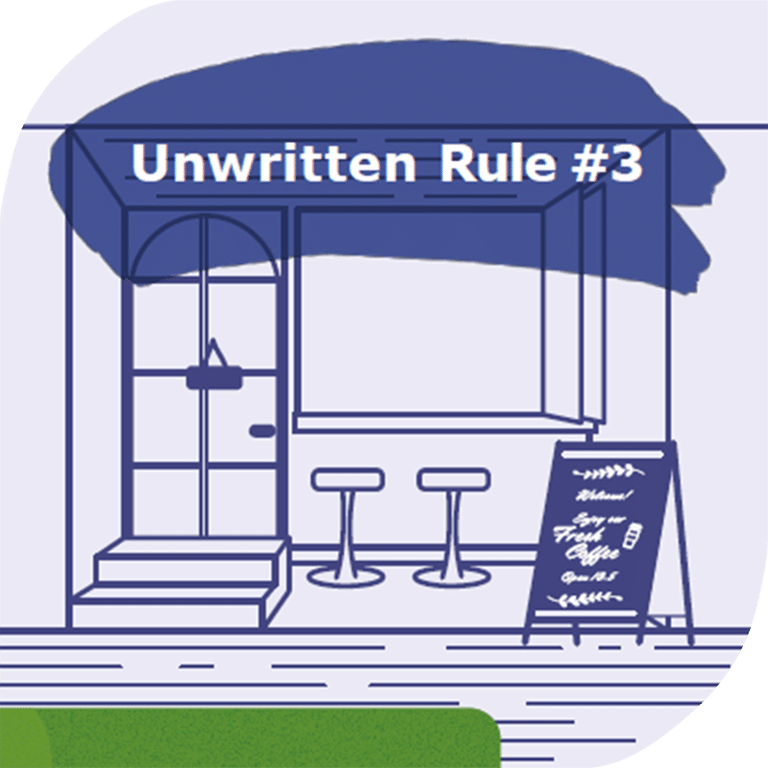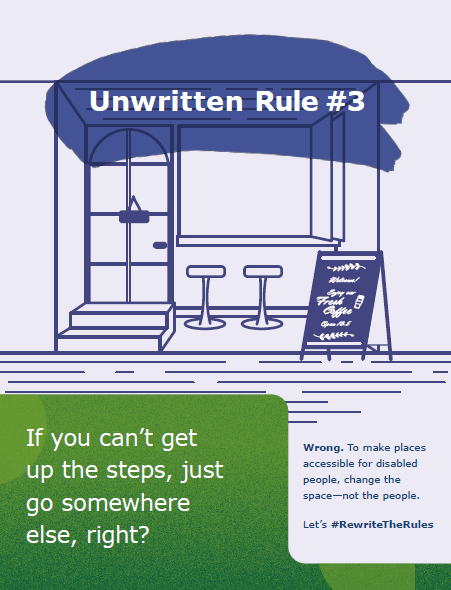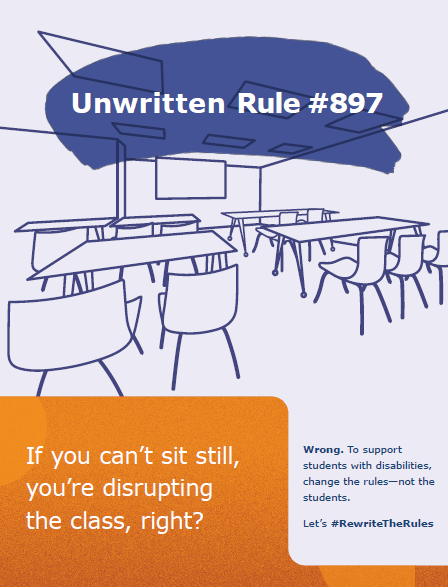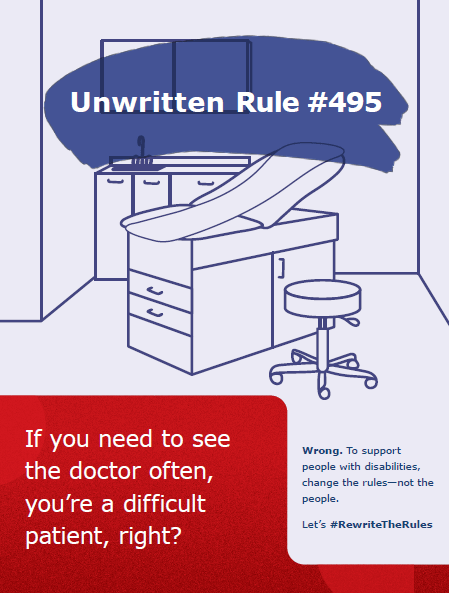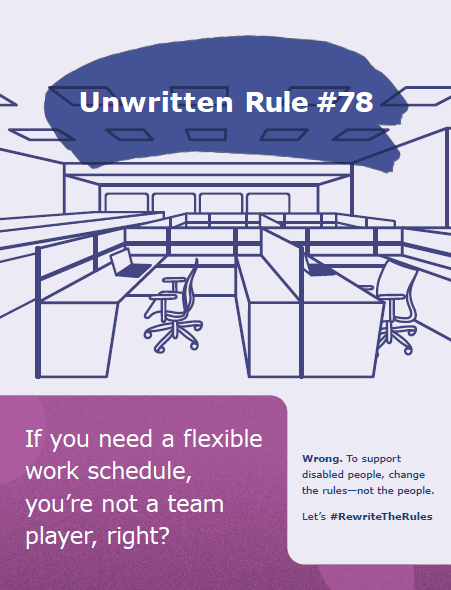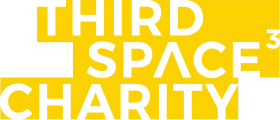About this campaign
This campaign hopes to drive more conversations about ableism. It is intended to encourage self-reflection and exploration.
The campaign was developed with support from disability representative organizations, including the BC Aboriginal Network on Disability, Disability Alliance of BC, Terrace and District Community Services Society, Third Space Charity and the Victoria Disability Resource Centre. These organizations serve people in every region of B.C.
This campaign puts emphasis on spaces, systems, and attitudes that create barriers for people with disabilities. You’re invited to think about how buildings, information, equipment, schedules and ways of doing things can be disabling.
People living with disability choose many different ways to describe themselves and these decisions represent important ways of thinking and talking about disability. You’ll see a few of these different ways used in this campaign.
As a teenager growing up with a disability, I didn’t know about the concept of ableism, but it’s a concept that would really have helped me to understand why I faced so many barriers in my day to day life.”
— Lauren Stinson, Disability Alliance of BC
Unwritten rules
-

Unwritten Rule #3
There are unwritten rules that able-bodied people rely on when designing buildings and public spaces for everyone. These rules impact where people with disabilities can go, how they get around and what activities they can join. Access is a human right. Help rewrite the rules so that communities are designed for everyone.
Translations are available in:
-

Unwritten Rules #897
Unwritten rules in education benefit abled, neurotypical students. These rules impact where students with disabilities go to school, what lessons and activities they join in and what learning goals they meet. Education is a human right. Help rewrite the rules so that education is designed for all kinds of learners.
Translations are available in:
-

Unwritten Rule #495
Unwritten rules in health care are designed to benefit abled patients. These rules impact how patients with disabilities are seen, what priority they’re given, and their diagnoses and treatment choices. Health is a human right. Help rewrite the rules so that health care is designed for everyone.
Translations are available in:
-

Unwritten Rule #78
Unwritten rules in workplaces can favour abled employees. These rules impact if people with disabilities can get jobs, what kinds of jobs they are offered, and how long they will stay in their jobs. Equal treatment in employment is a human right. Help rewrite the rules so that workplaces are designed for all kinds of workers.
Translations are available in:
We live by unwritten rules.
Unwritten rules tell us how we should think or act. They are not written down or even spoken out loud, and we mostly follow them without thinking about them. Unwritten rules about disability ignore, dismiss, or discredit people with disabilities. Everywhere they go people with disabilities experience these unwritten rules.
Nearly one million people in B.C. have a disability (source). But disability isn’t always easy to count. It depends on how disability is understood and how people see themselves.
43%
of human rights complaints in B.C. in the last 10 years have been filed on the basis of disabilities, the largest share of complaints filed with the BC Human Rights Tribunal (source: BCHRT Annual Reports, 2011-2021)
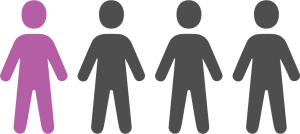
1 in 4 people with a disability in B.C. have personally experienced discrimination related to their disability in the last year. (source: BCOHRC Annual Poll 2022)
43%
1 in 8 (12%) say that accessibility and the rights of people with disabilities are one of the most important human rights issues to them and the people they care about (source: BCOHRC Annual Poll 2022)
Watch these videos to learn more about how people with disabilities are rewriting the rules
Stella Young: I’m not your inspiration, thank you very much
-
- Professional level audio and visual
- Professional closed captioning
- 24 translations available
- Transcript available at point of access
-
“Disability doesn’t make you exceptional but questioning what you think you know about it does.”
-
- Stella says, “we are more disabled by the society we live in than we are by our bodies and our diagnosis.” What are some of things in our society Stella says disables people?
- Why does Stella think it’s a bad thing for people with disabilities to be seen as inspirational?
- What changes does Stella want to see for people with disabilities? What changes could you make that would help to create this kind of world?
Sita Gaia: The hell of chronic illness
-
- Professional level audio and visual
- Professional closed captioning
- 4 translations available
- Transcript available at point of access
-
“I want you to sit here and take it in, feel it – and in the end, act in a useful and helpful way.”
-
- Sita describes chronic illness as a “world of loss.” What are some of the impacts of chronic illness Sita describes?
- Sita challenges us to think about chronic illness as our problem and society’s problem. What do you think they mean by this?
- Which of Sita’s three-point plan are steps that you take – or could take – to help make your school, workplace, or community more inclusive for people with chronic illness?
Gagan Chhabra: Exploring ableism – An invitation to create an inclusive society
-
- Professional level audio and visual
- Professional closed captioning
- English only
- Transcript available at point of access
-
“…all those non-disabled individuals, they assumed things about me, judged me, even before engaging with me.”
-
- Gagan gives examples of ableism in interactions he has experienced. Which example resonated with you?
- What are the two ways Gagan says ableism categorizes or objectifies people with disabilities?
- Gagan invites us to challenge our blind spots about disability. What are some blind spots about disability you have? What are some things you could do to challenge these blind spots?
Dan Bernstein: How to talk about mental health without offending everyone
-
- Professional level audio and visual
- Professional closed captioning
- 3 translations available
- Transcript available at point of access
-
“When we ask questions instead of making assumptions, we make room for the other story.”
-
- Dan received advice to keep his mental health diagnosis a secret. How did this impact him?
- Dan gives examples of stigma and paternalism in conversations about mental health. What unwritten rules might lead to these reactions?
- Which of Dan’s tools or ideas for talking about mental health are meaningful for you? Where might you use these tools in your everyday conversations?
Flip these cards to see how the rules are being rewritten
The disability community, partners and allies have been organizing and advocating for justice and equity for a long time in this province, in Canada, and internationally. See some examples of people doing this important work around accessibility and click through to learn more about their campaigns.
-
Buildings can be designed for everyone to access.
Rick Hansen Foundation
-
People with disabilities have unique strengths in the workplace.
Presidents Group
-
People with mental health disabilities have rights when receiving treatment.
Health Justice
-
Students with disabilities develop skills for life and work.
Inclusion BC
Protecting rights in the law
Rights for people with disabilities are protected through international, national, and provincial laws. Here are a few examples:
1. Listen to people with disabilities recite the United Nations Convention on the Rights of Persons with Disabilities
As a member of the United Nations, Canada formally committed to upholding the rights in this convention in 2010. The Convention helps promote and protect rights and freedoms for people with disabilities.
2. Read about the Accessible Canada Act
The Accessible Canada Act is a law passed in 2019 to make Canada barrier-free by January 1, 2040. Organizations under federal responsibility – for example, banks, airlines, the RCMP, and federal government have responsibility to remove barriers to access for people with disabilities.
3. Find out how B.C.’s Human Rights Code protects people with disabilities from discrimination
The Code protects people from harmful treatment based on their physical or mental disability. It upholds the rights of people with disabilities in employment, housing, services, and more.
4. Read about B.C.’s recent Accessibility Legislation
This new law provides a framework to remove and prevent barriers to people with disabilities. Provincial government services and over 750 public sector organizations – such as school districts, public universities, libraries and hospitals – are required to establish accessibility committees, publish accessibility plans and a build a tool to receive feedback on their accessibility.
Thank you for joining this conversation!
We are continuously learning from each other as we challenge ourselves to think differently about disability. The resources selected here seek to center the voices and work of people with lived experience of disability but represent only some of the ideas, conversations, and efforts working to build communities that work for everyone. We encourage you to continue to seek out opportunities to challenge your thinking and be a part of this work.
We invite your feedback about the campaign. Please take our quick survey or use to share your thoughts.
